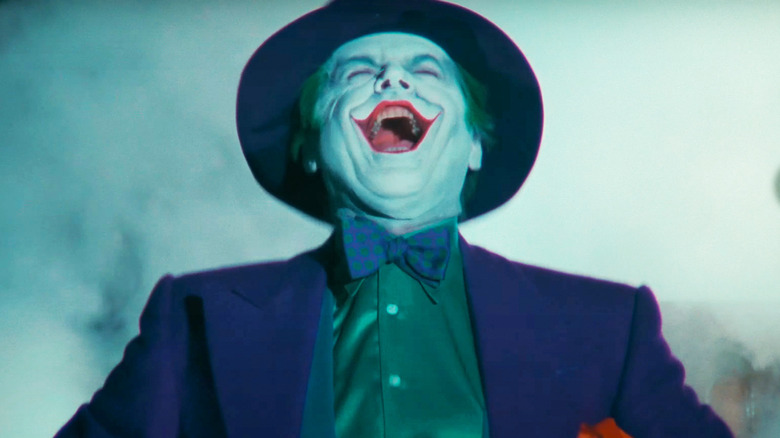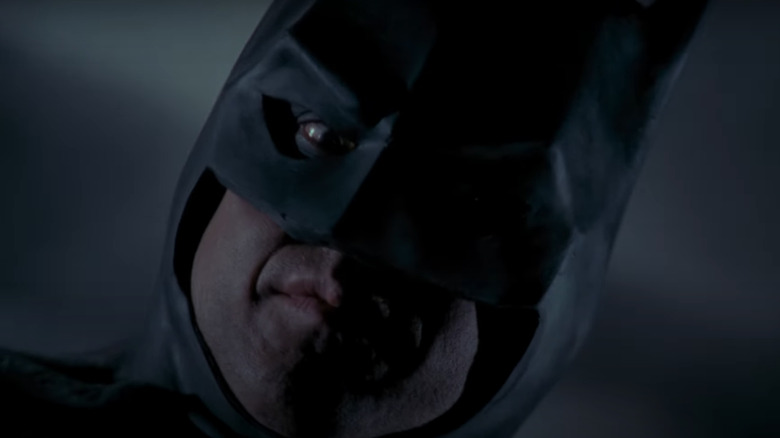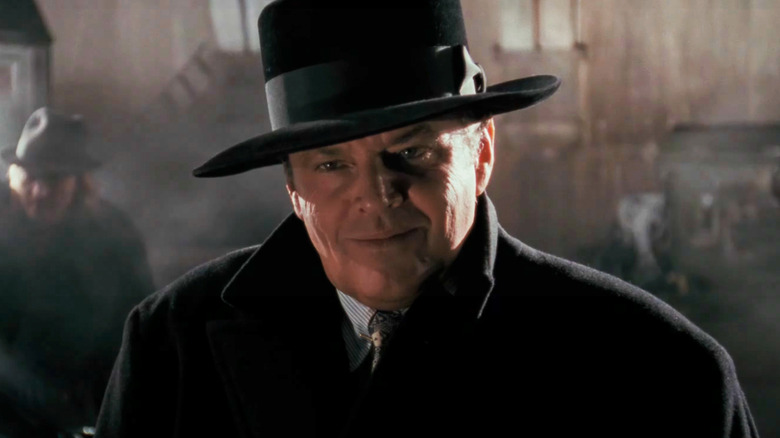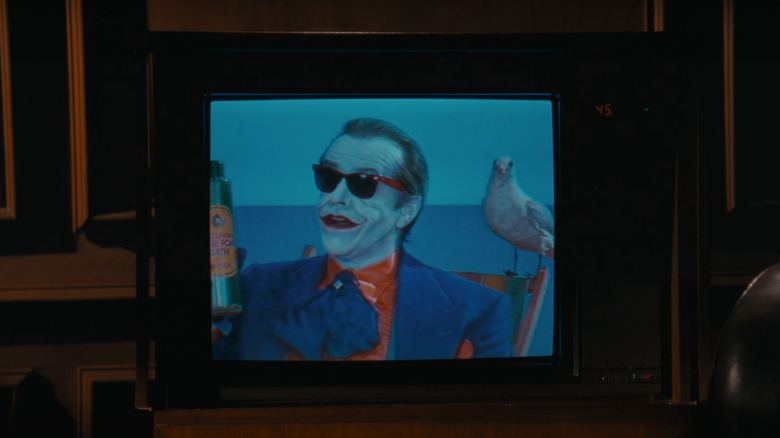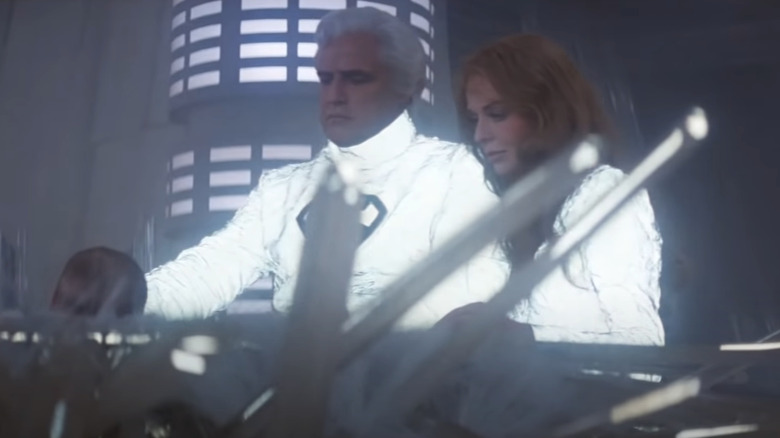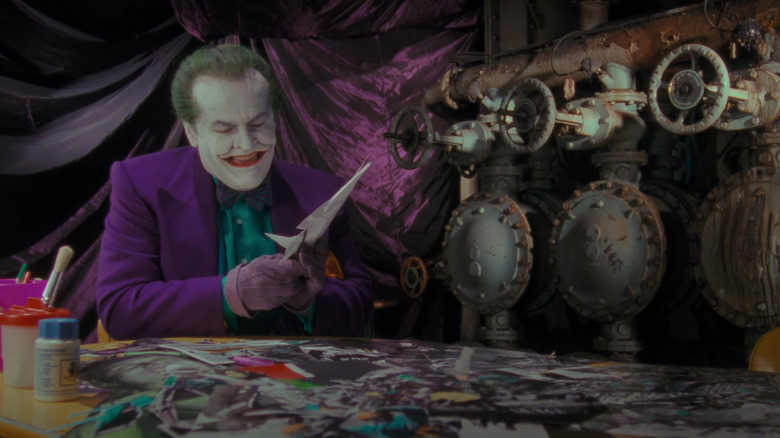Jack Nicholson's Casting As Batman's Joker Was Inspired By Marlon Brando's Superman Role
In 1978, Richard Donner gave us the first superhero blockbuster with "Superman." Treating its subject matter with reverence and respect, the movie established comic book adaptations not only as crowd pleasing spectacles, but as spaces in which more weighty themes could be explored. Bolstered by the presence of none other than screen legend Marlon Brando in the role of Superman's father, Jor-El, the film was not just a hit, it was a critical success that gave off an air of prestige. Then, things sort of went downhill.
After 1980's "Superman II," each subsequent entry in the franchise seemed to chip away at the respect superhero movies had earned in 1978. It didn't help that Marvel tried its hand at making a comic book adaptation in the form of 1986's historic flop "Howard The Duck." Of course, It would be 22 years before Marvel got their act together with 2008's "Iron Man" — the film that changed Hollywood forever and signaled the rise of the now omnipresent Marvel Cinematic Universe. In the interim, however, DC and Warner Bros. once again stepped into the fold to help resuscitate the flagging superhero movie, this time with the help of a decidedly darker hero.
With a global total of $411 million, 1989's "Batman" was a box office smash, despite most of the profits going to Jack Nicholson thanks to the historic gross-profits deal he managed to broker. But paying egregious amounts in return for having Nicholson star as Jack Napier/The Joker was probably worth it for Warner Bros. A decade after Donner's "Superman" debuted, the studio could once again claim to have put out a hugely successful crowd-pleaser that also carried a level of prestige. Which, for the producers, was the plan all along.
Batman was a huge risk
"Batman" is remembered as a Hollywood success story. But prior to its release, it was far from a guarantee that the movie would bring in audiences. Even Michael Keaton, whose casting prompted a firestorm of controversy when it was announced, knew that "Batman" was a massive gamble. Warner Bros. had put $35 million (a lot for the time) into making a movie that really had no precedent. Unlike "Superman," which affirmed and celebrated the public perception of its hero as the ultimate Boy Scout, Tim Burton's dark take on the Caped Crusader was an attempt to change public perception of the character — and there was no guarantee it was going to work.
Audiences mostly knew Batman from Adam West's lighthearted '60s TV show, and nothing beyond a few comic book runs such as "The Dark Knight Returns" suggested the masses were ready for Burton's shadowy vision. Not only that, the young filmmaker had only directed two other studio movies when he was handed "Batman" — "Pee-wee's Big Adventure" and "Beetlejuice" — which, while successful, didn't necessarily suggest he was capable of delivering a smash hit superhero blockbuster. Add to that the fact that production was troubled from day one, with Burton even describing the whole ordeal as "torture," and you start to get a picture of how shaky things were starting to look for those involved with its making.
In other words, "Batman" was a potential career-killer for the top brass at Warner Bros. and they needed all the help they could get. Luckily, they got a major assist from the Joker himself.
Casting Jack
If "Batman," which seemed like a huge gamble for Warner Bros. in the lead up to its release, could secure Jack Nicholson to star, it was going to make everyone feel a lot more comfortable. But the actor was not easy to get.
Director Tim Burton had to overcome his fear of horse riding to join Nicholson on a ride at his Aspen home. The actor also demanded top billing ahead of Michael Keaton, and reportedly engineered it so that he could take time away from shooting at the UK's Pinewood Studios to watch Los Angeles Lakers games. That was on top of the aforementioned, unprecedented deal that afforded Nicholson a cut of the film's profits before Warner Bros. could charge as much as possible to the film to make it look like it never actually made any money — a common studio trick used to avoid paying residuals.
But pretty much everyone behind the scenes was willing to make such sacrifices if it meant securing Nicholson for "Batman." By the late-'80s, the actor had gone beyond the height of his fame and transcended to legendary status. "One Flew Over the Cuckoo's Nest," "Chinatown," "The Shining" — these were already well-established classics at the time, and Nicholson had since begun what he saw as a "whole new phase of his career" with films like 1983's "Terms of Endearment," for which he won his second Oscar for a supporting role.
If "Batman" could use Nicholson's name to give it some prestige, it could conceivably follow in the footsteps of "Superman" and that movie's use of Marlon Brando. That would go a long way towards not only securing its success, but making everyone behind the scenes relax a bit.
Jack the 'force of nature' Nicholson
In a behind the scenes featurette, "Batman" producer Peter Guber explained how he viewed Jack Nicholson as "an acting force of nature," adding:
"It changed the nature of the comic framework into a film. From a movie into a film with the inclusion of Jack Nicholson. There was something to be discovered there by the critics and by the media, because they would find it intriguing that Jack wanted to do that."
But it wasn't just that Guber knew Nicholson would intrigue audiences. He'd seen something similar a decade earlier when Richard Donner tapped Marlon Brando for the part of Jor-El. He continued:
"Part of the thinking in getting Nicholson was really similar, going back to the Marlon Brando concept in the first 'Superman' picture. You get such a great deal of respectability for the picture, for what you're trying to do, that not only does that help bring audiences in from young to old, but it also makes it very attractive to other major stars to want to become the next Batman villain, to follow in the footsteps of Jack Nicholson."
Interestingly enough, Nicholson literally attracted another big star to the Batman franchise by personally convincing Danny DeVito to play the Penguin in the follow-up to "Batman," 1992's "Batman Returns."
Marlon f***ing Brando
In the mid-'70s, when producer Alexander Salkind contacted Richard Donner to direct "Superman," he'd already managed to bring Marlon Brando onboard. Donner may have had to salvage a disastrous first draft of the "Superman" screenplay, but he didn't have to overcome any horse-riding aversions or navigate insane contract negotiations in order to secure his Hollywood great. He did, however, visit Brando at his Hollywood home. And wouldn't you know, it was during a time when he and none other than Jack Nicholson lived on the same land. As the director told The Hollywood Reporter:
"I go to California and I meet Marlon F***ing Brando at his house on Mulholland Drive. Myself, [writer] Tom Mankiewicz, and [producer] Ilya Salkind. He and Jack Nicholson had a little compound. We rang the gate and a couple of German shepherds came down, and there's Marlon Brando."
Donner recalled how he and the group conversed with Brando until the actor finally brought up the part of Jor-El. The director continued:
"[Brando] said, 'How do we know what the people on Krypton looked like?' He had good logic. He said, 'Maybe they looked like bagels up there in those days?' I said, 'Jeez, Marlon, let me tell you something.' He'd just told us the story about a kid [and how smart he was] and I said, 'It's 1939. There isn't a kid in the world that doesn't know what Jor-El looks like, and he looks like Marlon Brando.' And he looked at me and smiled [and said], 'I talk too much, don't I?' He said, 'OK. Show me the wardrobe.'
Aside from being a neat story, it's also kind of cool to think of this Mulholland Drive compound housing two massive stars that would, a decade apart, help legitimize superhero movies.
Nicholson was the real superhero
Back when Marlon Brando was cast in "Superman," his presence was enough to inspire hushed reverence among everyone else involved, including star Christopher Reeve. As Donner said in the THR piece, "I remember how nervous Chris was, working with Brando. But Brando was nice to him. He was nice to everybody. They had dinner; he was Chris' hero. He was a doll."
At the close of the following decade, Michael Keaton would be similarly nervous to work with his on-screen hero, Jack Nicholson. In 1989, Keaton appeared on "Late Night With David Letterman" to talk "Batman," and brought up Nicholson as "the number one" actor he'd always wanted to work with. What's particularly interesting, though, is that he talked about how Nicholson also went through the same experience as a younger actor. As Keaton explained:
"When [Nicholson] did a movie called 'Missouri Breaks' with Brando, he had always loved Marlon Brando and wanted to work with him but he almost didn't take the movie because he thought 'I'm not sure I wanna blow it on this one if this isn't the right one.'"
Just as his hero would go on to give Superman a hand, so too would Nicholson help the Dark Knight reinvent himself for a new generation. In doing so, he also had a direct hand in reviving superhero movies, generally proving to be every bit as distinguished and capable of lending respectability to his movie as Brando was to "Superman." By bringing some much-needed gravitas to Tim Burton and Warner Bros.' big gamble, Nicholson proved himself to be the real superhero. If anyone was worth the obscene amount of money that "Batman" yielded, it was him.
